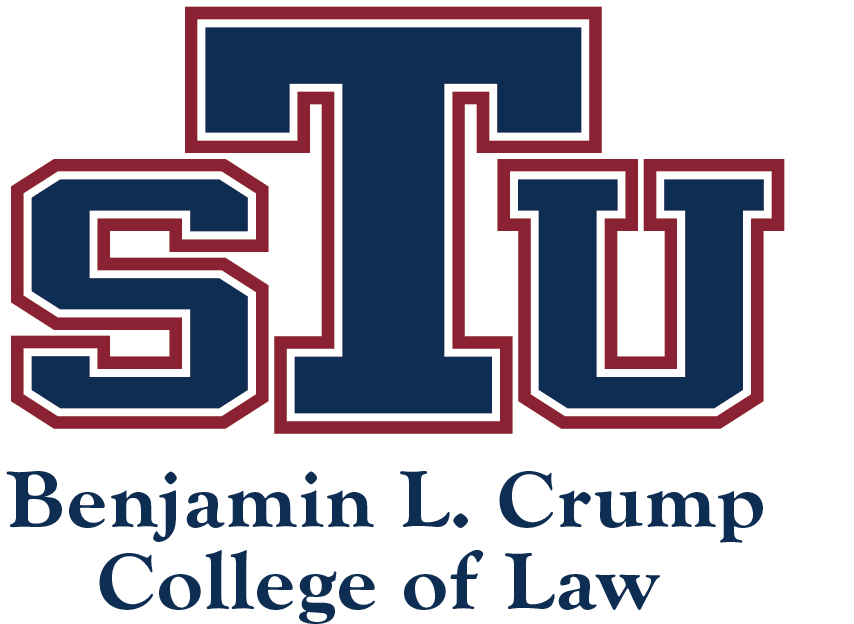Juris Doctor Degree Requirements
To be eligible for the degree of Juris Doctor (J.D.), a student must meet the residency requirements of the College of Law by having:
- Successfully complete 90 credits with a cumulative grade point average of 2.0;
- Attend as a “full-time” student or “flex-time” student (as defined below);
- Complete all required courses and academic requirements within five years of initial matriculation, unless a written extension of this period is granted by the Academic Standing Committee or the Dean;
- Complete the 50-hour pro bono requirement (as defined on the Pro Bono Requirements page and Pro Bono Handbook).
- Complete the skills requirement of at least 6 hours of designated skill course credit hours.
- Satisfy the Intensive Writing Requirement by receiving a passing grade in a seminar class.
“Full-time” study requires completion of 12 or more hours during fall and spring semesters. A “flex time student” must take at least 9 credits in any fall or spring semester. A student may be a “flex time” student only with approval of either the Assistant Dean for Enrollment and Scholarships or the Assistant Dean for Student Affairs.
A “credit hour” is an amount of work that reasonably approximates:
- Not less than fifty minutes of classroom or direct faculty instruction and two hours (120 minutes) of out-of-class student work per week for fifteen weeks (including one week for a final examination), or the equivalent amount of minimum total classroom or direct faculty instruction and out-of-class student work over a different amount of time; or
- At least an equivalent amount of work as required in 1.a. for other academic activities, including Independent Study, simulations, externships, field placements, clinical, law reviews or journals, advocacy teams, and other academic work for which units of credit are awarded.
When a student is out from school for any reason (for example, leave of absence, dismissal, visiting other schools), he or she will be obligated to meet the requirements in place at the time the student is readmitted to the College of Law.
Degrees are ordinarily conferred upon students who meet the prescribed academic requirements. The College of Law reserves the right, however, to withhold a degree whenever it appears that a student’s character, conduct, or the quality of work completed will prevent acceptable representation of the school or compromise the standards of the legal profession.
St. Thomas University considers the graduation ceremony to be an academic event. Only students who have completed all requirements for graduation prior to the date of the ceremony, and those students who have registered for the summer session to complete 9 or fewer credits remaining toward graduation, will be allowed to participate.
Please note that requisites for graduation are subjected to change by the faculty. Students must meet the requisites for graduation in existence in the semester in which they would otherwise graduate.
Required Courses
Full STU Law Course Catalog and Student Handbook available here
First Year Courses
Advanced Legal Research and Writing (3)
Civil Procedure (4)
Constitutional Law (4)
Contracts (4)
Criminal Law (3)
Legal Analysis, Writing, and Research (3)
Legal Skills (1)
Property (4)
Torts (4)
Upper-Level Courses
Appellate Advocacy (2)
Bar Prep Skills (4)
Business Associations (4)
Evidence (4)
Professional Responsibility (3)
*One Seminar Course (2 credits) (To satisfy Writing Requirement)
*Skills Requirement (6) (Advanced Legal Writing (3) plus at least 3 additional Skills credits; “{S}” in the course description)
In addition, students must complete four* credit hours from the following menu:
Bar Prep Skills II (2)
Civil Procedure Focus for the Bar (1)
Constitutional Law Focus for the Bar (1)
Contracts Focus for the Bar (1)
Any other approved “Focus for the Bar” course not listed
Evidence Focus for the Bar (1)
Florida Fundamentals Focus for the Bar (1-2)
Legal Methods and Essay Writing (2)
Property Focus for the Bar (1-2)
*At least two of the four required credits must be fulfilled by Bar Prep Skills II, Legal Methods and Essay Writing, or Advanced Legal Skills. At most, only 2 credits of the “Focus for the Bar” courses will count towards the required four credit hours. Students may take any or all “Focus for the Bar” courses, but only 2 credits will count towards this menu.
A student may not enroll in more than 15 hours in any fall or spring semester without the approval of the Associate Dean for Academic Affairs or their designee. Any student may take any number of credits (not to exceed 18) in their last semester if they obtain prior approval from the Associate Dean for Academic Affairs or a designee. No student may take more than 7 J.D. credits in any summer term, without express approval of the Associate Dean for Academic Affairs or a designee. No student is required to take classes any summer term.
Courses Recommended for Florida Bar
Criminal Procedure I, Criminal Procedure II, Sales, Remedies, Family Law, Commercial Law Survey, Guardianship Law, Juvenile Law, Complex Litigation, Conflicts of Law, Products Liability, First Amendment, Wills and Trusts, Civil Procedure Focus, Electronic Discovery, Federal Courts, Secured Transactions, Advanced Torts, Advanced Evidence, Land Use, Payment Systems, Florida Constitutional Law, Florida Practice and Procedure, Florida Criminal Procedure, any other Focus for the Bar course.
Distance Education
A student may not take more than 30 on-line credits towards the total of 90 credit hours required for the J.D. degree.
Non-Classroom Instruction
The College of Law limits total non-classroom credit hours to no more than 26 credit hours of the total of 90 credit hours required for graduation, thereby ensuring that at least 64 credit hours are earned through attendance in regularly scheduled classroom sessions or direct faculty instruction. A student earning a joint degree (J.D./M.B.A. or J.D./M.S.), is limited to no more than 13 non-classroom credit hours (in addition to the 13 non-law graduate course credit hours) of the total of 90 credit hours required for graduation.
Non-classroom courses include:
- Externships
- Internships
- Courses taken at a non-law college or school of St. Thomas University (including the credits earned toward the joint degree programs) or at another institution of higher learning
- Law reviews and journals
- Competitive moot court and trial teams
- Courses taken outside the United States for studies that are not law-related
Courses earned by attending regularly scheduled classroom sessions or direct faculty instruction, Simulation courses (for example, TAP and ICN), Law clinics (currently Appellate Litigation Clinic, Immigration Clinic and Tax Clinic), Distance education, and foreign law studies are not subject to the 26 credit limitation.
Pro Bono Requirement
50 hours (at least 25 hours legal).
Review the Pro Bono Requirements page and Pro Bono Handbook for more detailed information.
Skills Requirement
All students are required to satisfy the Professional Skills Requirement prior to graduation. The Professional Skills Requirements may be satisfied by successful completion of any one of the following courses and no others. Appellate Litigation Externship, Bankruptcy Externship, Civil Practice Externship, Criminal Practice Externship, Cyberlaw, Drafting of International Moot Court Competition Problems, Elder Law Externship, Environmental Law Practice, Environmental Litigation Practicum, Environmental Negotiations, Family Court Externship, Federal Appellate Project, Florida Civil Practice, Florida Criminal Practice, Florida Supreme Court Internship, Human Rights Lawyering, Immigration Clinic, International Arbitration, International Moot Court Classroom Component, International Moot Court Team, Interviewing Counseling and Negotiation, Judicial Internship, Law Office Management, Mock Trial Classroom Component, Mock Trial Team, Moot Court Classroom Component, Moot Court Team, Pax Romana Internship at the United Nations, Pretrial Practice, Real Estate Development and Finance, Real Estate Transactions, Tax Clinic, Transnational Litigation, Trial Advocacy Practice, U. S. Supreme Court Advocacy, How Lawyers Get Paid, and Trademark and Branding Law.
Leave of Absence
When a student is out from school for any reason (for example, leave of absence, dismissal, visiting other schools), he or she will be obligated to meet the requirements in place at the time the student is readmitted to the College of Law.
Graduation
Degrees are conferred upon students who meet the prescribed academic requirements. The College of Law reserves the right, however, to withhold a degree whenever it appears that a student’s character, conduct, or the quality of work completed will prevent acceptable representation of the school or compromise the standards of the legal profession.
Requisites for graduation are subject to change by the faculty. Students must meet the requisites for graduation in existence in the semester in which they would otherwise graduate.

